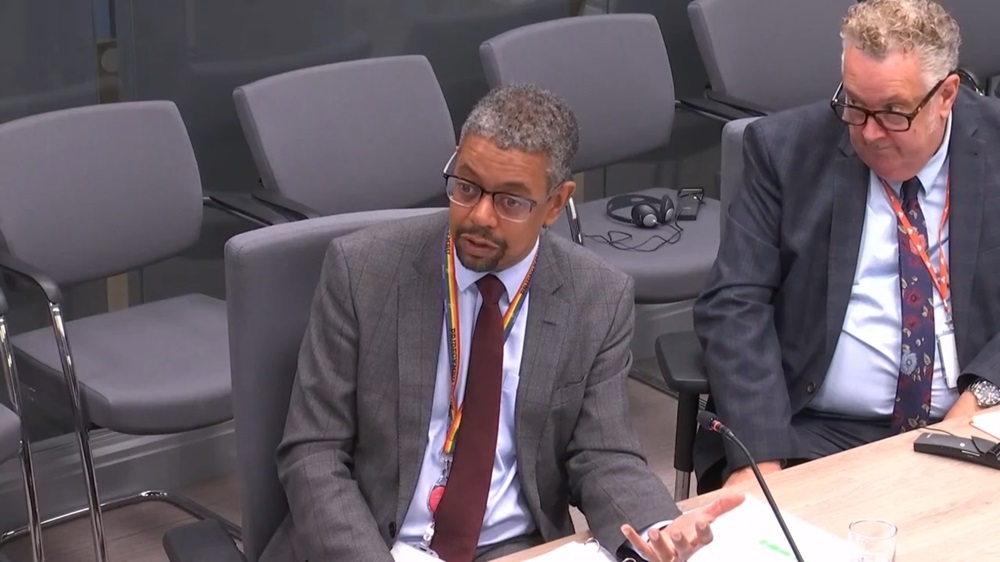Too many Welsh children in care – First Minister

Too many children are being taken from their families, the First Minister admitted, with more than one child in every 100 in Wales now living in care.
Vaughan Gething also warned far too many children and young people do not have a good experience of the care system as he gave evidence to a Senedd scrutiny committee.
John Griffiths raised concerns about an 83% increase in the number of children in care over the past two decades between 2003 and 2022.
The Labour MS for Newport East warned care rates are significantly higher than in England, with “massive, unexplained” variation within Wales.
Mr Gething said: “The picture is still broadly one where too many children are taken into care,” adding that “some people get decent outcomes” but “far too many don’t”.
‘Endemic’
The First Minister stressed that solving the problem is not as straightforward as the Welsh Government declaring “you cannot take children into the care system”.
Pressed about how he will reverse the trend, Mr Gething said the aim is not only to reduce numbers but to work with, and for, looked-after children to deliver better outcomes.
Alistair Davey, the Welsh Government’s deputy director of social services, told committee members that 25% of children in care are placed outside their home county.
Jenny Rathbone, the Labour MS for Cardiff Central, criticised the pace of change, raising concerns about “constant slippage” in the Welsh Government meeting milestones.
Warning that Wales is an outlier, with the high number of children in care an endemic problem, Ms Rathbone said councils are facing “huge” costs and potential bankruptcy.
‘Get a grip’
“We haven’t got time on our side and children’s lives are being affected,” she stressed.
Urged to get a grip, Mr Gething acknowledged the need for urgency but cautioned that there is not a switch to flick that will change outcomes for children and young people.
Mr Griffiths also raised concerns about educational outcomes for looked-after children, with only 17% getting five GCSEs at ‘C’ or above compared with 54% for pupils generally.
James Evans, the Tory MS for Brecon and Radnorshire, highlighted that looked-after children face significant additional challenges such as moving just before exams.
Recognising that such disruption has a very real impact, Mr Gething said GCSE results for looked-after children reflect the challenges in their lives rather than their ability.
‘Strategy factory’
He was not convinced about the need for a specific strategy, echoing Carwyn Jones’ concerns about the Welsh Government becoming a “strategy factory”.
Ms Rathbone pressed the first minister about concerns the Welsh Government’s “woolly” child poverty strategy lacks ambition and focuses too much on levers outside its control.
She said the children’s commissioner, Audit Wales, the Bevan Foundation and many others are among a chorus calling for clear targets on reducing child poverty.
Mr Gething stressed that poverty will be a key priority for his government, which will refocus on investing in the first 1,000 days of a child’s life.
He said delivering the objectives of the child poverty strategy would make a radical difference to the lives of children and young people.
‘No guarantees’
Warning that the private sector does not deliver the right quality of care and outcomes, the first minister set out plans to remove profit from the care of looked-after children.
He explained that Dawn Bowden, the newly-appointed social care minister, will bring forward a bill in the week beginning May 20 before the Senedd’s Whitsun recess.
Mark Isherwood, who represents North Wales, stressed that there is no guarantee a non-profit model will prevent money leaving the sector.
The Conservative warned public sector provision could ultimately cost more and deliver less.
Mr Gething said the reforms are not simply about profit motive, but delivering improved outcomes and making better use of the money.
‘Unmanageable’
Warning of a crisis in the social care workforce, James Evans raised concerns about an over-reliance on agency staff with high costs “crippling” councils.
The former councillor said social workers face unmanageable workloads, with as many as 40 cases at a time, as he called for a legal maximum on the number of cases.
Mr Gething rejected the suggestion, saying: “What do you do if you reach a limit and you are not legally allowed to take on any extra work if you have another child who needs support?
“Do you say ‘the inn is full, take your luck in the stable’ or do you say ‘actually, we’ve got to find a way to try to manage with the resources we’ve got’?”
Labour’s Jack Sargeant focused on corporate parenting, warning that more than 25% of children moved care placements twice or more in the year to March.
‘Undimmed’
Mr Sargeant, who represents Alyn and Deeside, backed the “bold and brave” decision to proceed with a basic income pilot for care leavers and asked if it could be extended.
Mr Gething would not give a hard-and-fast commitment, saying an evaluation of the project by Cardiff University will report in 2027 which is beyond the next Senedd election.
However, the first minister told MSs he would be surprised if Labour was not interested in taking the pilot forward with a manifesto commitment in 2026.
“I certainly hope the evidence allows us to do that,” he told the meeting on April 26.
Asked where care-experienced children sit on his list of priorities, Mr Gething stressed that the government’s commitment to a radical reform summit’s declaration is undimmed.
Support our Nation today
For the price of a cup of coffee a month you can help us create an independent, not-for-profit, national news service for the people of Wales, by the people of Wales.






Too worried about money to care about children and too worried about cost to look after children in care – Welsh government 🙂↕️